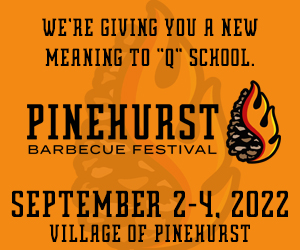The ultimate gated communities – North Carolina’s six military golf courses – offer up quite a bucket list for those who would like to check off the box of unique golfing experiences. Ever start a round with an F-15 fighter jet taking off in clear sight? Now is your chance …
More than ever “civilians” are being welcomed to tee it up at bases such as Camp Lejeune, Cherry Point, Fort Bragg and Seymour Johnson, and additional golf programs are being installed at each location to appeal to the troops, especially the younger generation, from relaxed dress codes to foot golf.
Once saddled with a stigma of being “an officer’s game” or “the general’s course,” golf military style has battled the same challenges recently as the rest of America — attracting and then retaining golfers.
Working on military base with the threat of deployed at any moment can be stressful for troops and their families. Golf offers a necessary diversion of sorts for those looking for recreation, family time with the kids or just some friendly competition with buddies.
“You sort of unplug from your daily stress and grind,” said Seymour Johnson AFB Community Support Flight Chief Joe Heinrichs. “You are stuck in that military world and when you come out to the golf course you flip a switch, even if you are not on the world’s nicest golf course. It’s you, your club, the ball and birds chirping along — and here it is an occasional F-15 in the background.
“That’s cool for people outside the gates who come through and come in and play, or when our families come here to play. We’re somewhat immune to it but most people are like ‘did you see that fighter jet?’”
Rounds are down at most of the state’s military courses, but all of the golf GM’s or head pros to a man are trying to make a difference. For example, John Johnson at Paradise Point at Camp Lejeune, a 36-hole venue, was once in the golf industry, then went into the Navy in the mid 1990s, only to return to golf and taking his position here three years ago.
“This is a blast,” said Johnson, who spent nine years at a golf course in Georgia before arriving at the two George Cobb layouts. “I have loved it since the first day I stepped on to the property during my first interview. I was never welcomed so much at a facility as I was here. I think I fit in here. I love it here.”
Johnson has tried to make every Marine and family members feel welcomed on the Scarlet and Gold courses.
“We want to make this Disneyland for the Marines,” Johnson said. “We have the concept that anybody who comes through the golf shop we want them smiling when they leave. Whether it’s a junior, a lady golfer, a new golfer, an experienced golf – it doesn’t matter to us – we want them to have a good time, laugh, carry on and relieve some of the pressure they have outside of the golf course.
“And we look at this place as Cheers; we want to get to know your name, we want you to be a regular customer, we want you to come back. I don’t need to know your rank, but I would like to get to know you as a person, get to know you as a golfer and fill your needs on that end first.”
Jeff Johnson, the director of golf at Fort Bragg’s Ryder and Stryker courses, also has an affinity for the military, spending a majority of his golfing life in Florida, but has since returned to North Carolina with a purpose. Johnson went to high school in Fayetteville, to college at Methodist and often played the two Fort Bragg courses, one of which is a Donald Ross layout.
“The biggest thing for me is I wanted to see both of these golf courses succeed,” he said. “I always felt they weren’t given the proper attention and they could be better than what they have been. And before I leave here someday I hope both of them reach that level.”
Golf, in general, is not federally funded on the bases, so the operating budget comes mostly from revenue generated the conventional golf way – from rounds and pro shop sales.
However, Johnson is pumping more than $60,000 into renovations on the Ross course that is located off Bragg Boulevard, hoping to slowly get the layout back in better shape. Stryker will also get a fleet of new carts by the end of August.
“We’ve spent more money on the two golf courses this year than we ever have in the history of this place,” he said. “I pushed for that. You have to compete with those outside the gate in the private sector to keep our courses relative and keep the golfers coming back here. Listen, I can’t offer a military discount like the other public golf courses around me do. We ARE the military.”
At Three Eagles at Seymour Johnson, Heinrichs has a “Dream List” of items he submits to his bosses. The list is long and large, but he’s hopeful each budget session he’ll peck away at a few needed items to improve his course.
“We’re working on a big picture, starting a partnership with the local Goldsboro community,” Heinrichs said. “We’re changing our global outlook to really focus more on that community partnership. One of our goals, and we’re probably talking 2020, is to relocate our clubhouse down by the gate; the theory being that Mr. Goldsboro or Mr. Raleigh or Mr. Greensboro can drive up, park in the parking lot, get his golf bag and go through the clubhouse and get on a cart and he would be on the base.”
All six of the state’s military golf courses are public. If you are not a member of the military, golfers can call for a tee time and have someone at the pro shop sponsor them to get on base, or in the case of Fort Bragg, bring your license, car registration and proof of insurance, submit to a 5-minute background check, and then hit the links.
One benefit of Stryker is that it is located off base, and can be used as a starting point to get onto Ryder in the event 36 holes is in the cards.
Here is a look at each of the military layouts in the Tar Heel state.
Military Golf Courses: Cherry Point Air Station
Military Golf Courses: Fort Bragg Army Base
Military Golf Courses: Seymour Johnson Air Force Base
Military Golf Courses: Camp Lejeune Marine Corp Base


















